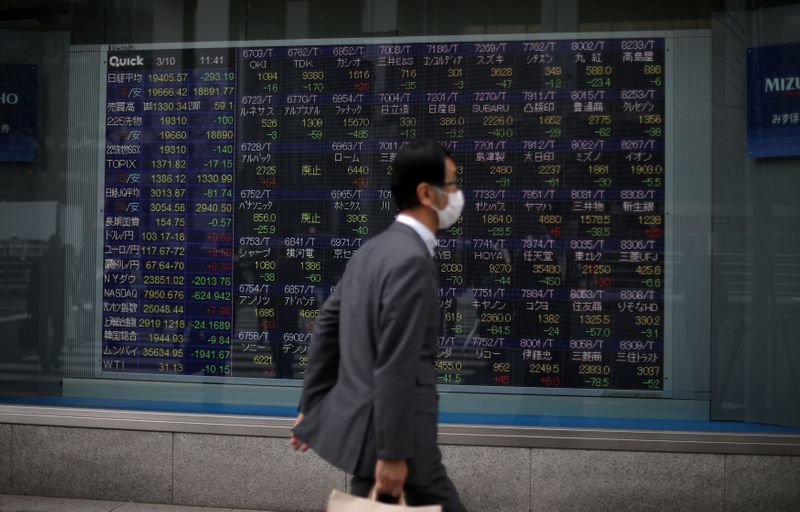By Stanley White and Alun John
TOKYO/NEW YORK/HONG KONG (Reuters) - Asian shares advanced on Tuesday as positive economic data from China and the United States helped to close out a strong quarter, though a renewed surge in global coronavirus cases underlined a challenging investment climate.
MSCI's broadest index of Asia-Pacific shares outside Japan (MIAPJ0000PUS) was up 0.51%, on course for its highest quarterly gain in nearly 11 years.
However, it was not clear whether the optimism would carry over into European trading, with EUROSTOXX 50 futures (STXEc1) losing 0.7%, FTSE futures (FFIc1) shedding 0.36%, and E-Mini futures for the S&P 500 (ESc1) down 0.24%.
Asian markets got an early boost after an official survey on China's vast factory sector showed activity quickened last month, defying expectations for a modest slowdown. That came on top of strong U.S. housing market data overnight, which helped drive up Wall Street stocks despite a worrying surge in coronavirus cases in the country and around the world.
The Chinese factory data lifted its blue chips (CSI300) which jumped 0.82% to their highest level since mid March.
Still, most analysts cautioned against getting carried away by the factory data, noting that export orders were still contracting.
"The divergence of the domestic recovery and foreign orders contraction highlights that the Chinese economy remains affected by the global situation for the Covid-19 pandemic," ING analysts said in a note.
"As new infection cases globally continue to grow, we believe that China will continue to face a contraction in export orders in the coming months."
The headline numbers, however, were enough to cheer markets.
Shares in Australia (AXJO) were also up 1.43%, Korea (KS200) jumped 1% and Japan (N225) rose 1.33%, despite a larger-than-expected decline in Japanese industrial production.
Hong Kong stocks (HSI) tacked on a more modest 0.1%, giving up much of the sizable early gains as investors came to terms with the Chinese parliament's passage of a security law that will increase Beijing's control over the former British colony.
The move has sparked international condemnation and caused the U.S. to begin steps to remove the territory's special status.
On the whole, Asia ex-Japan shares were on course for a 17.8% gain in the second quarter, which would be the biggest quarterly increase since the third quarter of 2009. Stocks appear to have received an added boost as some investors adjusted positions on the last trading day of the quarter.
However, despite the bounce and underscoring the scale of the pandemic-sparked rout earlier this year, the index was still set for a 7% decline since January 1.
"Overnight moves in markets were not large but one does get the distinct impression that markets have got it both ways – with equities rallying on rebounding data and bonds rallying on dismal COVID-19 news," said ANZ Research analyst Rahul Khare.
The strong housing data boosted the Dow Jones Industrial Average (DJI) up 2.32%, and the S&P 500 (SPX) up 1.47%
The yield on benchmark 10-year Treasury notes (US10YT=RR) was little changed at 0.6299% in Asia as traders braced for U.S. non-farm payrolls data on Thursday, which is forecast to show an improving labour market.
However, the yield on U.S. five-year treasuries dropped slightly to a record low of 0.271%.
U.S. Federal Reserve Chairman Jerome Powell on Monday said the outlook for the world's biggest economy is "extraordinarily uncertain" and signalled more monetary stimulus may be necessary, which could limit gain in yields.
A recent resurgence in coronavirus infections had led some investors to question the strength of a rebound in global economic activity, with sentiment swinging between hopes and fears.
The bulk of new cases were reported in the United States and Latin America, stoking fears that the outbreak could stall economic recoveries just as lockdowns begin to ease.
In currency markets, the dollar was mixed in the Asian session swinging between small gains and losses against a basket of currencies.
The greenback was a touch up at 107.64 yen
U.S. crude (CLc1) fell 0.73% to $39.41 a barrel, while Brent crude (LCOc1) slipped 0.58% to $41.44 per barrel, weighed by concerns about oversupply after Libya cited progress in resuming oil exports. [O/R]
